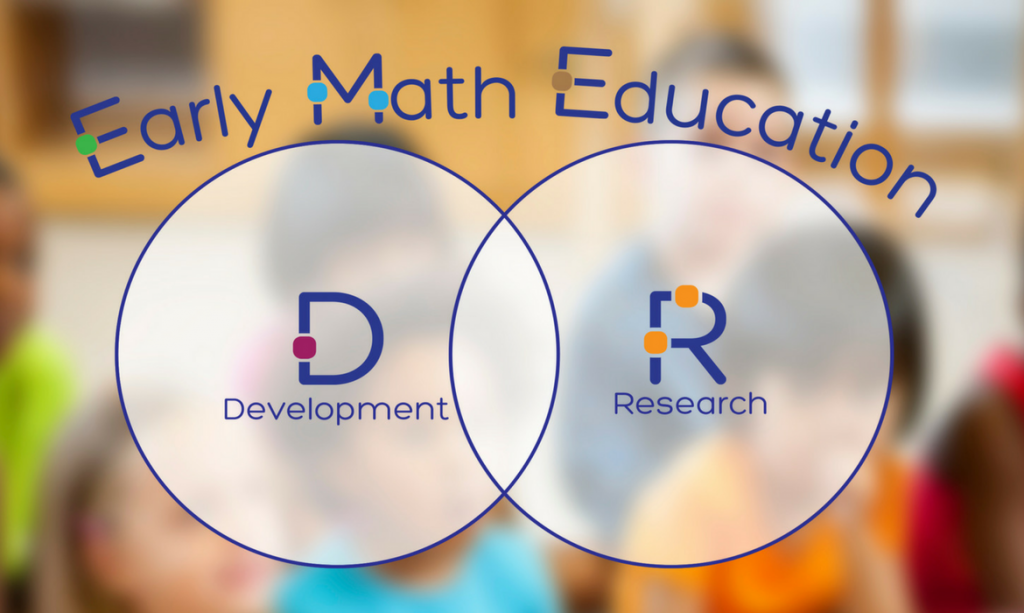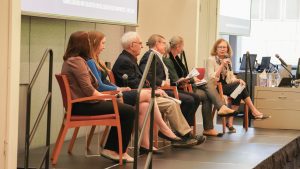Conducting research and developing tools to ensure all children have the opportunity for rich experiences in early math.
Imagine a world where all children feel curious and confident when it comes to mathematics. They delight at the challenge of solving a math problem and see math all around them—at the playground, in nature, and in their homes. They have equitable access to excellent mathematics education and go on to become adults who can make sound decisions based on data, possess strong logical thinking skills that open the doors to well-paid jobs, and are positioned to fully participate in our democratic society.
The reality is we still have a ways to go to crystalize that vision. When it comes to math achievement, American high schoolers rank behind many other advanced industrial nations around the world. Especially concerning is the low math performance of students from low income and minority backgrounds compared to their more affluent and white peers. Further, American adults lag behind adults in many other nations when it comes to workplace skills, and the biggest deficits are in math.
Research evidence accumulated over the past decade indicates that math skills at kindergarten entry predict later academic success. This research has prompted a push for expanding the traditional emphasis on reading and literacy in the early years to also promoting the development of math skills. But are children ready to learn math before elementary school? The answer is an unqualified YES. From infancy through the preschool years, often without adult assistance, children develop an understanding of a variety of math topics, including number and operations, space, and basic geometry. Intentional teaching builds on this informal knowledge and provides structure and opportunities to propel children’s mathematical growth. What’s more, rich mathematical activities are engaging and fun. Kids love them!
So where does DREME come in? While recent years have seen important contributions to the knowledge base in early math education, many unanswered questions remain. DREME, which stands for Development and Research in Early Mathematics Education, is a network of 12 prominent scholars who collaborate to find effective ways to teach math to young children, create teacher-training resources, develop instructional materials for parents and early childcare providers, and produce research findings to inform sound policy making. The DREME Network is funded by a generous grant from the Heising-Simons Foundation.
DREME Network members collaborate across four projects that address critical needs related to improving the math education of young children:
Early Math Resources for Teacher Educators. It may sound counter-intuitive, but teaching math to young children is actually very complex. To be effective, teachers need to understand how children’s mathematical thinking unfolds and acquire effective pedagogical strategies. The Professional Development project is creating a set of free, easy to use, online professional development modules that teacher educators can use to promote pre-service and in-service preschool teachers’ competence to teach math. Content modules include counting, spatial relations, operations, patterns and algebra, and measurement and data.
Math +. The Math+ project investigates the relationship between math skills and executive function skills, which include the ability to sustain attention during a task, remember directions, consider multiple perspectives, and exercise impulse control. The linkages between math and executive function skills are not yet well understood but the available research suggests that their development is intertwined and mutually reinforcing. The Math+ team is currently investigating the nature of this association and its implications for how to teach early math. Further, the team is developing and testing activities intended to simultaneously promote the development of children’s mathematical thinking and executive functions. Activities that emerge as effective in accomplishing this goal will be available for free on our website.
Family Math. Quantity and quality of math early stimulation at home and in informal childcare settings vary enormously, with lasting consequences for academic achievement. DREME’s Family Math researchers are developing and testing a variety of resources, including books, games, and activities intended to maximize the quality of math interactions between young children and their parents and caregivers. The project’s ultimate goal is to disseminate free, research-based resources that parents and caregivers can use to promote math learning among young children.
Preschool Through Elementary School Coherence. Learning in preschool is often disconnected from learning in the elementary grades, and this disconnect may be particularly acute in mathematics. Because learning builds upon earlier learning, discontinuity or inconsistency in preK–3 curriculum and instructional strategies may have a negative impact on student learning. To address this concern, many states and districts are implementing policies and practices intended to promote continuous and high quality math instruction from preschool through the elementary years. This goal entails the ambitious task of aligning two educational systems that are very different in emphasis, funding sources, and structure. DREME’s COHERE team is documenting efforts to create policy alignment and continuity in early math education at two diverse school districts in California. Further, the team is investigating factors at the district, school, and classroom levels that hinder or facilitate those efforts, and ultimately measuring the impact of alignment policies on students’ learning.
The DREME Network is committed to growing the number of researchers who study the development of young children’s math competencies and how to best support that development. To that end, a significant portion of our funding goes toward doctoral students and postdoctoral fellows involved in Network research. DREME constitutes a vibrant community of scholars who come together to contribute their diverse areas of expertise to create knowledge and resources to promote math learning in the early years.
You can learn more about DREME’s work on our website. There is much more to come, so visit often and sign up to here to receive notice when new resources become available.
The DREME Network includes Deborah Stipek (Chair, Stanford University), Amy Claessens (University of Chicago), Douglas H. Clements (University of Denver), Cynthia Coburn (Northwestern University), Eric Dearing (Boston College), Dale Farran (Vanderbilt University), Megan Franke (University of California, Los Angeles), Herbert Ginsburg (Columbia University), Susan Levine (University of Chicago), Michele Mazzocco (University of Minnesota), Gigliana Melzi (New York University), and Linda Platas (San Francisco State University).



